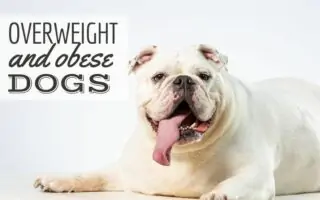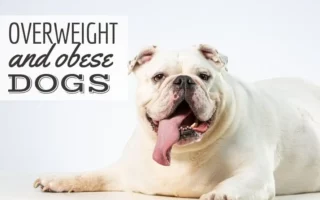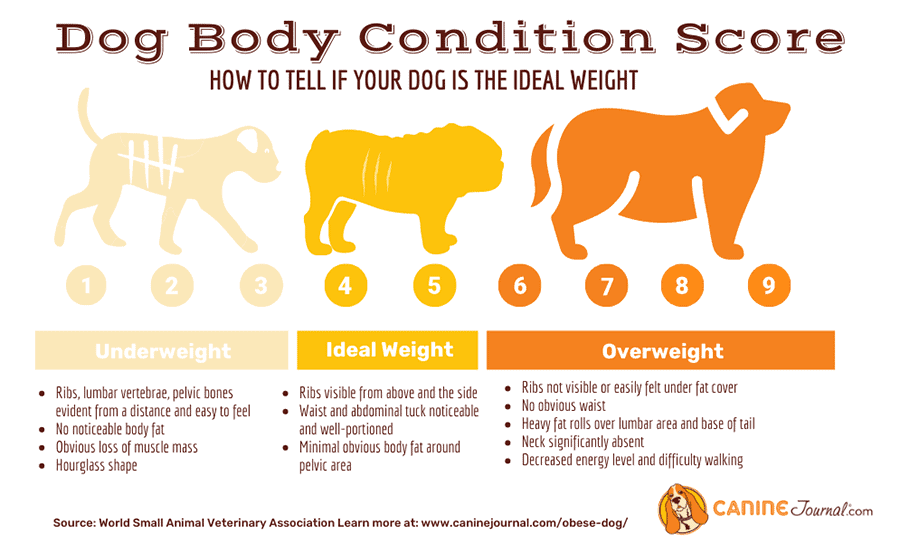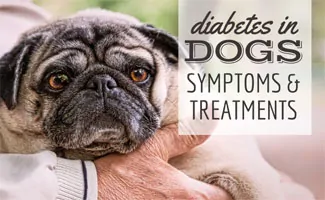
 You might find fat dogs adorable for their roly-poly appearance, but obesity is a serious health threat for dogs and can severely affect their quality of life. Even slightly pudgy pooches who are only packing on a few extra pounds can be at risk for developing chronic health problems. We’ll give you some tips on how to tell if you have an overweight or obese dog, how to find the best overweight dog food, and much more.
You might find fat dogs adorable for their roly-poly appearance, but obesity is a serious health threat for dogs and can severely affect their quality of life. Even slightly pudgy pooches who are only packing on a few extra pounds can be at risk for developing chronic health problems. We’ll give you some tips on how to tell if you have an overweight or obese dog, how to find the best overweight dog food, and much more.
Article Overview
Contents
Is My Dog Overweight?
Since most dogs’ bodies are more compact than humans’, all dog sizes and breeds have a very narrow ideal weight range. Your veterinarian can determine if your dog is at a healthy weight. But here are some quick tips on how to tell if your dog is overweight.
- Stand behind your dog and rub your hands along the sides of his rib cage. If you can feel (but not see) your dog’s ribs without having to press down, then he’s likely at a decent weight.
- Look at your dog from above and the side. If your dog looks oval-shaped, he’s likely overweight. If your pup has an hourglass shape, he’s probably at a healthy weight.
- Your dog is likely overweight if you notice abdominal sagging or he has a large, round face.
Overweight Dog Symptoms
 In addition to your dog’s body shape, some other physical signs indicate that your dog is overweight.
In addition to your dog’s body shape, some other physical signs indicate that your dog is overweight.
- Tires easily
- General lethargy
- Is reluctant to go for walks or lags behind
- Excessive panting
- Needs help getting in and out of cars
- Poor/dull skin and coat condition
Overweight Dog Chart
Most veterinary clinics use a body condition scoring system like the one below to determine if a dog is too thin, healthy, overweight, or obese.

How Do Dogs Get Fat?
Diet & Exercise
 Unfortunately, overfeeding and too little exercise are the most common reasons dogs gain too much weight. This can happen by being uninformed about your dog’s daily caloric requirements based on his exercise level, the type of your dog’s food, giving him too many treats, etc. It’s also problematic as our dogs age because they need reduced calories, especially if they aren’t as active.
Unfortunately, overfeeding and too little exercise are the most common reasons dogs gain too much weight. This can happen by being uninformed about your dog’s daily caloric requirements based on his exercise level, the type of your dog’s food, giving him too many treats, etc. It’s also problematic as our dogs age because they need reduced calories, especially if they aren’t as active.
Chronic Illness
Weight gain in dogs can also occur with some underlying health conditions. A common chronic condition, hypothyroidism, can cause weight gain because the thyroid gland produces too few hormones to regulate the body’s metabolism. Cushing’s disease causes a dog’s body to produce too much cortisol, which helps regulate appropriate body weight, among other functions.
Genetics
Some breeds are more susceptible to weight gain and obesity, including American Cocker Spaniels, Basset Hounds, Beagles, Cavalier King Charles Spaniels, Dachshunds, Golden Retrievers, Labrador Retrievers, Shetland Sheepdogs, and several other less commonly known breeds.
What Is The Best Dog Food For Overweight Dogs?
 When you’re looking for the best diet for overweight dogs, first consult your veterinarian to check for any underlying health conditions and to help you develop a weight loss plan for your pup. When it comes to the best dog food for overweight dogs, you want to consider choosing a high-quality dog food with:
When you’re looking for the best diet for overweight dogs, first consult your veterinarian to check for any underlying health conditions and to help you develop a weight loss plan for your pup. When it comes to the best dog food for overweight dogs, you want to consider choosing a high-quality dog food with:
- Lean protein, such as chicken, lamb, or turkey, as the first ingredient. Protein takes more energy to break down than carbohydrates or fat and helps maintain muscle mass.
- Plenty of vitamins, minerals, and fatty acids to ensure that your dog gets essential nutrients when he’s eating less.
- A high fiber and/or water content. This helps give your dog a greater volume of food without the added calories (to keep him feeling full when on a diet). Look for healthy, fiber-rich vegetables like broccoli, cauliflower, celery, and green beans. For more water, look for fresh dog food or canned food. Or you can soak kibble in water before giving it to your pup.
How Much To Feed Overweight Dogs
One rule of thumb is to reduce your dog’s daily caloric intake by one-third, but this can be over-generalized for many dogs. We recommend consulting with your veterinarian, who can calculate your pup’s daily caloric needs to lose weight safely.
Every dog is different, and vets consider many factors, including breed, ideal weight, size, activity level, how much weight they need to lose, etc. Also, if you have an overweight puppy or senior dog, their caloric needs will differ from adult dogs.
Health Risks For Overweight Dogs
Extra weight (even a few pounds in some cases) can cause significant health problems and shorten your dog’s life. Some of the common health conditions that develop from excess weight include:
- Diabetes mellitus
- Heart disease & high blood pressure
- Arthritis & increased risk of joint injuries
- Increased cancer risk – especially intra-abdominal cancers, mammary tumors, and bladder cancer
- Liver or kidney problems
Frequently Asked Questions
Here are some of the most common questions we see about dog and pet obesity.
What Percent Of Pets Are Overweight?
Pet and canine obesity statistics are grim. According to the Association of Pet Obesity Prevention, an estimated 60% of cats and 56% of dogs in the U.S. were obese or overweight in 2018.
What If My Dog Is Overweight But Doesn’t Eat Much?
If you’re sure your dog isn’t sneaking food from other pet bowls and he’s getting enough exercise, there could be an underlying health problem, such as Cushing’s disease or hypothyroidism, causing your dog to be overweight despite not eating much. So it’s important to take your dog to the vet to get tested for any possible diseases.
Can Dogs Get Diabetes From Being Overweight?
 Yes, for sure. Diabetes is one of the major health conditions that can result from your dog being overweight. Diabetes typically appears in dogs seven to nine years old, but it can hit earlier if your dog is obese. Some of the early warning signs of diabetes in dogs include increased hunger, thirst, urination, and weight loss despite eating normally.
Yes, for sure. Diabetes is one of the major health conditions that can result from your dog being overweight. Diabetes typically appears in dogs seven to nine years old, but it can hit earlier if your dog is obese. Some of the early warning signs of diabetes in dogs include increased hunger, thirst, urination, and weight loss despite eating normally.
What’s A Good Overweight Dog Exercise Program?
The key with out-of-shape, overweight dogs is slowly but steadily starting an exercise regimen. At first, aim for two 10-minute walks each day and gradually extend your walks to 30 minutes or more. However, be careful not to overdo it — overweight dogs are prone to overheating and heat stroke.
Ensure your dog has access to water and stops walking if he’s panting excessively. You could even consider getting your own dog treadmill for extreme temperatures and rainy days.
Is There A Harness For Overweight Dogs?

One Obese Dog’s Success Story
The brief video below shares a heartwarming story about Obie, a severely obese rescued Dachshund, and his year-long journey to lose a whopping 50 pounds.
How To Help Your Pup Lose Weight
Regardless of whether your dog is obese or just carrying around a couple of extra pounds, it’s time to take action to get your pup at his ideal, healthy weight. There are several ways you can help your dog lose weight, from putting him on a diet to getting more exercise.
Changing your dog’s daily habits will take some time, so be patient as your dog adjusts. And be sure to consult with your vet to develop the best plan for your pup’s specific weight loss needs.
Disclaimer: This website contains reviews, opinions and information regarding products and services manufactured or provided by third parties. We are not responsible in any way for such products and services, and nothing contained here should be construed as a guarantee of the functionality, utility, safety or reliability of any product or services reviewed or discussed. Please follow the directions provided by the manufacturer or service provider when using any product or service reviewed or discussed on this website.